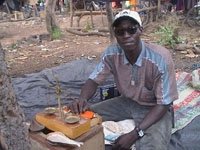The Social and Cultural Context of Small-scale Gold-mining in West Africa Today
Research Period: 1999-2004
Major Research sites: Atakora Mountains, Bénin; Region Kankaba, Mali
Funding: Max Planck Institute for Social Anthropology, Halle /Saale, Germany
The project addressed the social and cultural context of small-scale gold-mining in areas of immigration in West Africa today. Case studies in Benin, Mali, Ghana and Burkina Faso were chosen as empirical background. The project focused on the relationship of immigrants and local inhabitants in these frontier societies between modes of integration and separation, the emergence of social norms and practices concerning the access to resources, organisation of labour, ways of settlement and conflict resolution. Furthermore, social and cultural elements of identity processes (concerning young gold-miners), local politics (inside the local power field and in relation to the state) and aspects of risk management of gold-miners were analysed.

Results
There is a patronal mode of labour organisation dominated by relations of small entrepreneurs and working mates. The gold miners are related to shaft owners and gold traders in specific risk-sharing arrangements. Gold-mining is highly integrated into local and transnational market economies. At the same time it follows the logics of a moral economy of gold-mining, e.g. it is embedded in a network of reciprocities between gold-miners. Miners generally work in multiethnic teams. A particular ethics is maintained, including modes of sharing, modes of conduct and the acceptance of intricate risk minimising strategies. There are local institutions of conflict resolution (e.g. the assembly of shaft owners, mediators), which manoeuvre generally beyond the realm of state authorities, establish distinct norms, rules and sanctions and create a particular semi-autonomous social field.

In the adjacent communities, we have witnessed stabilising social processes since the beginning of the gold-boom. The integration of immigrants is conducted partly by the local host-guest systems and joined working teams. A common corporate identity of gold-miners emerges across ethnic origins. It is based on shared professional ethics, friendship ties and a particular lifestyle. It may enhance further integration of immigrants into the mining camps. Conflicts persist, however, between local inhabitants and immigrants about property and settlement rights.
The relationship of miners to the governmental authorities is guided by mutual distrust. The government follows contradictory policies between negotiation with some miners and the exclusion of others, especially trying to control the gold-trade.
The future development of small-scale gold-mining remains widely open.
Further Information: https://www.eth.mpg.de/3640950/project
Major Publication : Tilo Grätz 2010. Goldgräber in Westafrika. Berlin: Reimer-Verlag.


 Die
Die